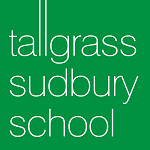Tallgrass students on “library hill” near our outdoor school space.
Last Wednesday, the morning after a shaky presidential debate in a highly contentious election year, a 14-year-old boy ran a meeting. He did a good job.
There were about 10 people at the meeting, mostly other middle-school-aged students. The meeting was held outdoors, interrupted frequently by noise from traffic passing by, and was socially distanced because of the ongoing pandemic. This small, young group meeting under less-than-ideal conditions was tasked with deciding whether to allow a dog to visit the school, adjusting nerf gun regulations, changing staff job descriptions, and whether a medical accommodation was reasonable. Sounds like a recipe for disaster?
I wish you could have seen it.
On first glance, it might not have seemed like a “good” meeting. There was lots of joking around, which sometimes brought the meeting off track. At another point, someone moved to impeach the chair because they thought he was misusing his power.
But the meeting was real. It was democracy in action, the way it’s meant to be: we were in it together.
We spoke up as best we could over the traffic, and occasionally repeated the words of someone with a softer voice.
The chair made joking motions, and then retracted them as he realized that his jokes were actually getting in the way of what needed to be a serious discussion.
We tried not raising hands for part of the meeting, and then changed that when people spoke up and said they were more comfortable raising their hands.
The medical accommodation discussion veered off into giving the person advice about their medical condition. I said I didn’t think that was appropriate, even though it was clearly well intentioned. A few minutes later, someone did the same thing again, and someone else spoke up and said they should stop.
We supported each other. We did our best. We talked about important things and silly things. We learned. Decisions were made, and other decisions weren’t made but the issues involved got clearer. It was a worthwhile use of an hour of people’s time.
The important part of democracy is not the big, idealistic concept. It’s grappling with real issues, day to day, with real people. The important part is that a community, whether a city or a school, finds ways to tackle problems that give everyone equal rights and allow everyone to ask from the community and contribute to the community.
Later that day our Judicial Committee met. The case they handled was fairly complex--someone had kissed someone. Normally, pecking someone consensually on the cheek would be fine. But because of the pandemic, any kind of touching is against school rules. The committee, made up of mostly students, had to investigate whether or not it had happened. Who knew about it, and should they have reported it sooner? Should there be consequences for the kiss itself, and should there be consequences for lying about it?
These are real questions, the kinds of questions and problems our students work on every day. They don’t just go to school, they help run the school. They help run it because that is the best way to keep an institution fair and honest: to make sure that everyone who is part of it has a real voice. And they do a good job, a job that compares well to almost any organization of adults I have seen. The skills they learn through these hard conversations will make them better parents, employees or employers, and citizens.
At Tallgrass Sudbury School, we are here, together, trying to work things out whether it’s hot, cold, or in the middle of a pandemic. On hard days and easy days, we’re doing it together. Some days it’s messy. Some days it’s beautiful.
And I am honored to be part of it.


